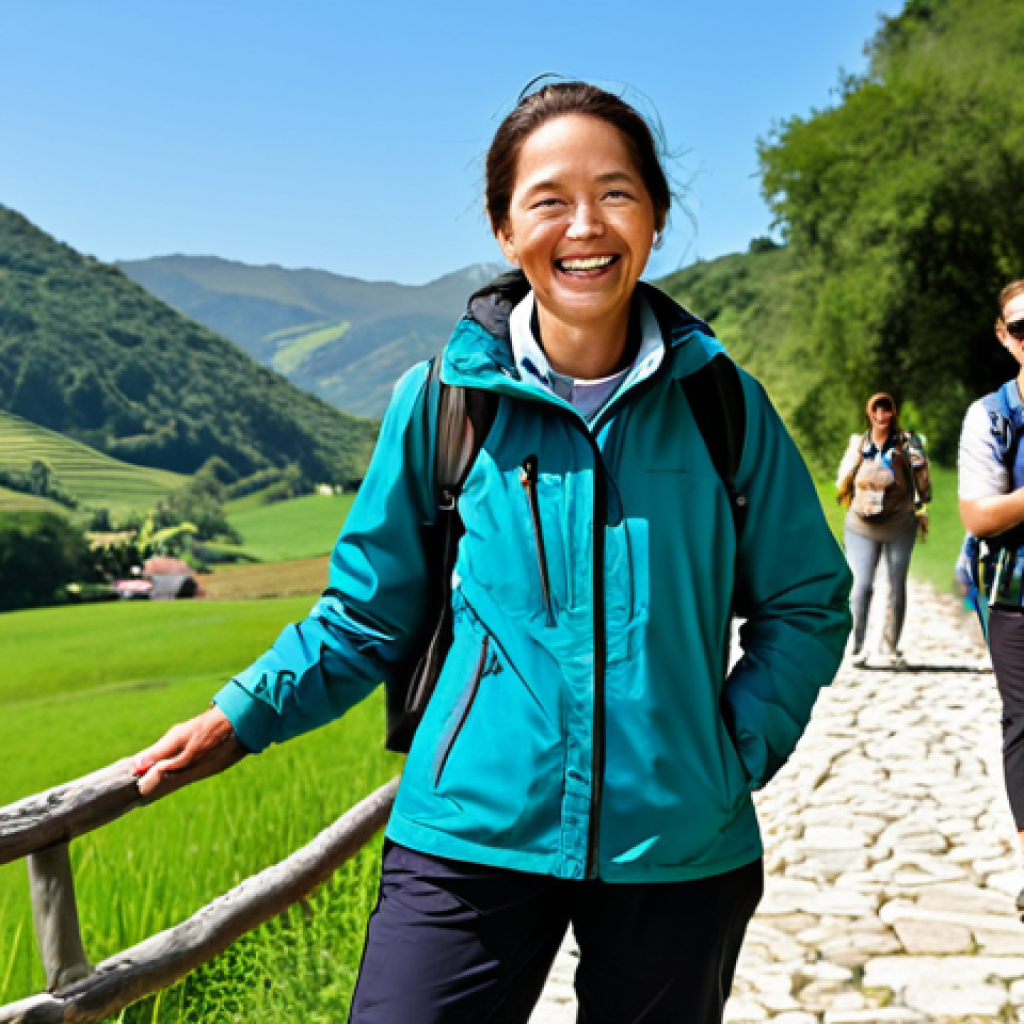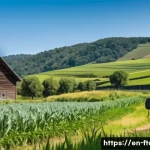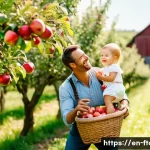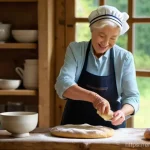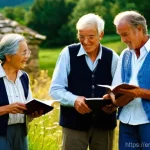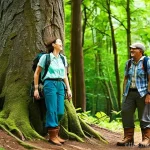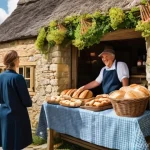Have you ever yearned for that genuine escape, far from the city’s hustle, into the soul-refreshing embrace of the countryside? I certainly have, and I’ve noticed a profound shift: rural tourism isn’t just a niche anymore; it’s become a major player, offering authentic experiences people truly crave.
The demand for deep, meaningful connections to local culture and nature has exploded, especially in our post-pandemic world. This surge means the role of a rural guide has dramatically transformed.
It’s no longer about simple directions; it’s about curating unforgettable narratives and connecting visitors with the land’s hidden stories and sustainable practices.
If you’re passionate about sharing these unique rural gems, a comprehensive professional education is key to meeting this evolving demand and excelling in a field that’s truly blossoming.
Let’s explore this further below.
Have you ever yearned for that genuine escape, far from the city’s hustle, into the soul-refreshing embrace of the countryside? I certainly have, and I’ve noticed a profound shift: rural tourism isn’t just a niche anymore; it’s become a major player, offering authentic experiences people truly crave.
The demand for deep, meaningful connections to local culture and nature has exploded, especially in our post-pandemic world. This surge means the role of a rural guide has dramatically transformed.
It’s no longer about simple directions; it’s about curating unforgettable narratives and connecting visitors with the land’s hidden stories and sustainable practices.
If you’re passionate about sharing these unique rural gems, a comprehensive professional education is key to meeting this evolving demand and excelling in a field that’s truly blossoming.
The Irresistible Pull of Authentic Rural Experiences
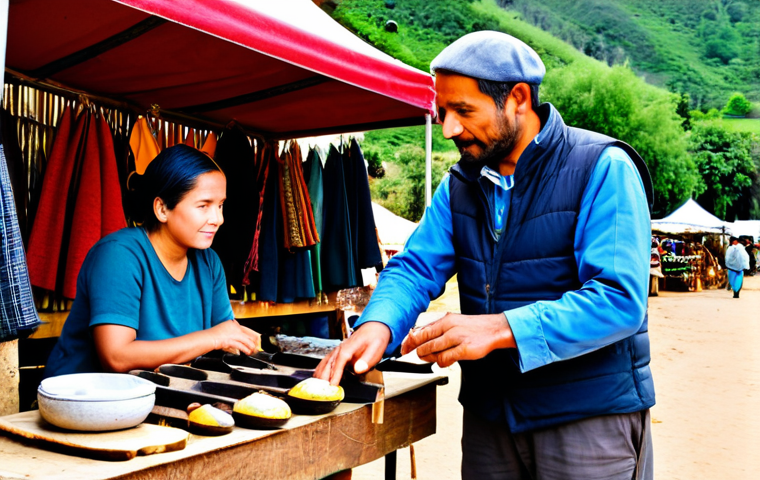
1. The Deep-Seated Craving for Connection and Simplicity
In a world that seems to spin faster every day, constantly connected and endlessly demanding, I’ve personally witnessed a palpable yearning for something simpler, something more real.
People aren’t just looking for a vacation spot anymore; they’re actively seeking a genuine escape, a chance to truly disconnect from the digital noise and reconnect with the foundational elements of life.
This isn’t just a trend; it’s a fundamental human need emerging from our overstimulated lives. Visitors want to touch the soil, taste food grown just miles away, hear the stories of generations, and feel the rhythm of a life lived closer to the earth.
It’s about finding that calm, that peace, that sense of belonging that often gets lost in urban environments. I remember a family I guided last summer; the kids, initially glued to their phones, were utterly transformed after an afternoon foraging for wild berries and learning about local folklore.
Their faces, alight with genuine curiosity and wonder, perfectly encapsulated this universal yearning. They weren’t just observing; they were participating, experiencing, and truly living the moment.
This desire for immersion and authenticity is what truly sets rural tourism apart.
2. Escaping the Echo Chamber: Discovering Unique Local Narratives
Beyond the picturesque landscapes, what truly draws people to the countryside, in my experience, are the untold stories and the vibrant local cultures waiting to be discovered.
It’s about stepping outside the homogenized experience of globalized travel and finding something truly unique, something that resonates on a deeper, more personal level.
Every village, every farm, every winding path holds a narrative – of resilience, tradition, innovation, and community spirit. As a guide, my passion lies in unearthing these narratives and bringing them to life for visitors.
It could be the tale of a century-old family farm adapting to modern sustainable practices, the forgotten history of a local craft, or the vibrant traditions of a seasonal festival that most tourists never even hear about.
These aren’t just facts; they are living histories that offer a profound sense of place and belonging. I’ve seen the look of awe on visitors’ faces when they meet a local artisan who’s been perfecting their craft for decades, or when they share a meal prepared with ingredients from the very land they’re exploring.
These are the moments that forge unforgettable memories and cultivate a true appreciation for the local way of life, something far more meaningful than just ticking off famous landmarks.
The Evolving Landscape of the Modern Rural Guide
1. From Mere Navigator to Master Storyteller and Cultural Interpreter
The days of a rural guide simply pointing out directions or listing facts are, thankfully, long gone. The modern rural guide, as I’ve found in my own journey, is less a human GPS and more a living bridge between visitors and the profound spirit of a place.
We’re not just showing you where to go; we’re unveiling the ‘why’ and the ‘how’ behind everything you encounter. This means stepping into the role of a master storyteller, weaving together historical facts with local legends, ecological insights with personal anecdotes.
It’s about bringing the landscape to life, making the trees whisper secrets and the rivers sing forgotten songs. I remember leading a group through a seemingly ordinary forest trail; instead of just identifying trees, I shared tales of how generations used the forest for foraging, told stories of the ancient trees themselves, and even pointed out subtle animal tracks, creating a vivid, immersive narrative.
The transformation in the visitors’ engagement was immediate – they weren’t just walking, they were actively exploring a living, breathing ecosystem with a rich past.
This deep dive into cultural interpretation ensures that visitors leave not just with photos, but with a profound understanding and connection to the heart of the countryside.
2. Curating Immersive Moments: Beyond the Itinerary
In this new era of rural tourism, it’s not enough to simply plan a route; the true value lies in the art of curating unforgettable, immersive moments that resonate deeply with visitors.
This goes beyond the bullet points of an itinerary and delves into creating experiences that evoke emotion, spark curiosity, and foster genuine connection.
As someone who’s spent years perfecting this, I can tell you it often involves spontaneous detours, unexpected encounters, and a deep understanding of what truly makes a moment magical.
Perhaps it’s arranging a surprise picnic with local delicacies by a hidden waterfall, or facilitating an impromptu chat with a farmer about their organic practices, or even just pausing at the perfect moment to witness a breathtaking sunset over rolling hills.
These aren’t pre-planned events; they are intuitive decisions made in the moment, based on reading the group, the environment, and the mood. My goal isn’t just to show you the countryside; it’s to help you feel it, taste it, breathe it.
It’s about creating those ‘aha!’ moments, the quiet observations, and the shared laughs that turn a simple trip into a cherished memory. This level of personalized, authentic engagement is what truly elevates the experience and makes a rural guide indispensable.
Essential Skills for Cultivating Rural Experiences
1. Mastering Local Lore, Natural Environments, and Sustainable Practices
Becoming an exceptional rural guide isn’t just about enthusiasm; it demands a profound, almost encyclopedic, knowledge of the local area, its history, its ecological nuances, and, crucially, its sustainable practices.
I’ve spent countless hours personally exploring every trail, researching local archives, and conversing with long-time residents to truly understand the heartbeat of the land I guide.
This isn’t just about identifying a specific bird or tree; it’s about understanding the intricate web of life, the historical significance of a forgotten ruin, or the traditional methods of farming that have shaped the landscape.
For instance, knowing the difference between edible and poisonous wild berries is critical, but knowing the cultural stories associated with those berries, or how they contribute to the local ecosystem, is what truly enriches the experience.
Furthermore, a deep commitment to and understanding of sustainable tourism principles is non-negotiable. It’s our responsibility to educate visitors on Leave No Trace ethics, promote responsible interactions with wildlife, and highlight the importance of supporting local, eco-friendly businesses.
This ensures that the beautiful places we cherish remain vibrant for generations to come, something I deeply believe in and actively practice every single day.
2. Developing Robust Interpersonal and Adaptability Skills
Beyond factual knowledge, the true magic of a rural guide lies in their interpersonal prowess and their unwavering adaptability. Guiding isn’t a monologue; it’s a dynamic conversation, a journey shared with individuals who come with diverse expectations, needs, and energy levels.
I’ve learned that effective communication, active listening, and genuine empathy are paramount. You need to be able to read a group, understand their unspoken desires, and anticipate potential challenges.
Moreover, the rural environment itself is inherently unpredictable. Weather can shift in an instant, a trail might be unexpectedly blocked, or a vehicle might encounter an issue.
My own experiences have taught me that quick thinking, resourcefulness, and a calm demeanor in the face of the unexpected are absolutely vital. One memorable time, a sudden downpour threatened to derail an entire day’s plan; instead of panicking, I quickly rerouted the group to a charming local pottery studio for an impromptu workshop, turning a potential disaster into a delightful, unique experience.
This ability to pivot, problem-solve on the fly, and maintain a positive, reassuring presence is what builds trust and ensures every visitor feels safe, engaged, and thoroughly cared for, regardless of what the countryside throws our way.
| Key Skill Area | Description & Why It Matters | Example Application in Guiding |
|---|---|---|
| Local Expertise & Ecology | In-depth knowledge of regional history, flora, fauna, geology, and cultural heritage. This depth allows for rich storytelling and authentic engagement. | Identifying rare wildflowers and explaining their medicinal uses, sharing local folklore about a specific landmark, or detailing the history of a traditional farm. |
| Communication & Storytelling | Ability to engage, educate, and inspire visitors through compelling narratives, adapting to different audience interests and backgrounds. | Transforming a simple walk into an immersive journey by weaving together historical facts, personal anecdotes, and local legends. |
| Sustainable Tourism Principles | Understanding and promoting eco-friendly practices, responsible waste management, and minimizing environmental impact. Essential for preserving natural beauty. | Educating visitors on “Leave No Trace” principles, encouraging support for local, environmentally conscious businesses, and discussing conservation efforts. |
| First Aid & Safety Readiness | Proficiency in basic wilderness first aid, navigation, and emergency preparedness. Paramount for ensuring visitor safety in potentially remote settings. | Handling minor injuries on the trail, navigating challenging terrain, or adapting plans quickly due to sudden weather changes or unforeseen obstacles. |
| Interpersonal & Adaptability | Strong empathetic listening, conflict resolution, and the ability to pivot plans based on group dynamics or unforeseen circumstances. Vital for group cohesion and satisfaction. | Reading the group’s energy to adjust pace, finding alternative activities during unexpected bad weather, or mediating different preferences within a group. |
Building Unshakeable Trust and Authority: The EEAT Factor
1. Demonstrating Authentic Experience and Verifiable Expertise
In the realm of rural tourism, where personal connection and safety are paramount, the principles of Experience, Expertise, Authoritativeness, and Trustworthiness (EEAT) aren’t just buzzwords; they are the very foundation upon which a successful guide builds their reputation.
I’ve personally found that truly demonstrating authentic experience is key. It’s not enough to just read about a trail; you have to have hiked it in all seasons, camped under its stars, and felt its nuances.
When I speak about the challenges of a certain climb or the joy of spotting a rare bird, it comes from genuine, lived experience, and visitors can sense that authenticity.
My expertise isn’t just theoretical; it’s forged through years of hands-on guiding, countless interactions with local communities, and continuous learning about the natural world.
This includes formal certifications in wilderness first aid and local ecology, but also the informal education gained from spending my life immersed in the countryside.
When visitors see that I’m not just knowledgeable but genuinely passionate and experienced, it immediately establishes a level of trust that no amount of marketing can replicate.
They’re not just hiring a guide; they’re connecting with someone who truly lives and breathes the rural life they’re eager to explore.
2. Cultivating Credibility and a Reputable Personal Brand
Beyond direct experience, establishing your authority and building a reputable brand as a rural guide is about consistently delivering exceptional experiences and actively fostering trust within the community and among your clientele.
For me, this has involved everything from meticulously planning every aspect of a tour to going above and beyond to ensure visitor satisfaction, often anticipating needs before they’re even voiced.
It’s about building a strong online presence through authentic testimonials and vivid storytelling on platforms where potential visitors seek information.
I’ve learned that word-of-mouth is still incredibly powerful in this niche, so every single tour is an opportunity to impress and create advocates. Furthermore, collaborating with local businesses – be it a small family-run farm, a local artisanal shop, or a heritage center – not only enriches the visitor’s experience but also solidifies my standing as a trusted, integrated part of the local ecosystem.
When local farmers endorse your tours or a village elder shares their wisdom with your group, it lends an undeniable layer of authority and credibility.
This consistent effort to uphold high standards, combined with genuine local connections, ensures that my guiding services are not just recommended, but sought out, because of the unwavering trust and respect I’ve painstakingly built over the years.
Sustaining the Future: Guiding with Environmental and Cultural Integrity
1. Championing Responsible Tourism: Beyond Leave No Trace
My passion for the countryside extends far beyond simply showing people around; it’s deeply rooted in a profound commitment to protecting these precious environments for future generations.
For me, responsible tourism goes far beyond the widely known “Leave No Trace” principles, though those are absolutely fundamental. It’s about actively promoting a deeper understanding of ecological sensitivity and fostering a mindset of stewardship among visitors.
This means not just telling people not to litter, but explaining the long-term impact of even a small piece of plastic in a natural ecosystem. It means educating them about wildlife corridors, sensitive plant habitats, and the delicate balance of local ecosystems.
I make it a point to integrate lessons on conservation into every tour, showing how our actions, big or small, contribute to the health of the land. For example, during a recent hike, instead of just walking past an area affected by erosion, I took the time to explain its causes and what local conservation groups were doing to mitigate it, encouraging visitors to support such initiatives.
This proactive approach ensures that every guided experience leaves not just cherished memories, but also a heightened sense of responsibility and respect for the natural world.
2. Empowering Local Communities Through Ethical Tourism Practices
True sustainability in rural tourism, as I’ve always believed, must also extend to the human element – the vibrant local communities that are the heart and soul of these regions.
My guiding philosophy centers on ensuring that our presence as tourists genuinely benefits these communities, rather than imposing upon them. This means consciously choosing to support local businesses, from the charming bed-and-breakfasts to the family-run restaurants and artisans’ workshops.
I make a deliberate effort to incorporate visits to these local establishments into my itineraries, creating direct economic opportunities for residents.
For example, instead of packing lunches, I often arrange for groups to enjoy a meal at a local farm-to-table eatery, allowing them to taste authentic regional cuisine while directly supporting local farmers and chefs.
Furthermore, I prioritize respectful cultural engagement, ensuring visitors understand and appreciate local customs, traditions, and social norms. It’s about fostering genuine interactions that are mutually enriching, where visitors learn from locals, and locals feel valued and respected.
This ethical approach to tourism not only provides a more authentic and meaningful experience for my guests but, crucially, empowers the communities I cherish, ensuring that tourism becomes a force for positive, sustainable development, rather than just an extractive industry.
Monetizing Your Passion: Beyond the Basic Tour Fee
1. Diversifying Income: Crafting Workshops and Curated Local Products
For many passionate rural guides like myself, turning a love for the countryside into a sustainable living often requires thinking creatively beyond just charging a tour fee.
I’ve personally found immense success and fulfillment in diversifying my income streams, allowing me to deepen my engagement with visitors and the local community.
One incredibly rewarding avenue has been offering specialized workshops that tap into the unique skills and resources of the rural environment. Imagine a “Foraging for Beginners” workshop where participants learn to identify edible plants, followed by a communal cooking session using their harvest, or a “Farm-to-Table Cooking Class” hosted by a local chef using ingredients from nearby farms.
These aren’t just tours; they are immersive, skill-building experiences that command higher fees and attract a different demographic. Beyond workshops, curating and selling local products can also be a significant income booster.
This could range from partnering with local artisans to offer their handmade crafts as souvenirs, to creating branded merchandise that reflects the spirit of the region.
I’ve even seen guides successfully sell small batches of homemade preserves or herbal teas made from ingredients sourced during their tours, adding a tangible piece of the experience for visitors to take home.
This multi-faceted approach transforms a simple guiding service into a comprehensive rural experience business, generating robust revenue.
2. Leveraging Online Presence and Strategic Partnerships
In today’s interconnected world, a strong online presence and strategic partnerships are absolutely vital for maximizing reach and monetizing your guiding passion, even for a hyper-local niche like rural tourism.
I’ve personally invested significant time in building a compelling online platform – a blog showcasing my experiences, high-quality photos of the landscapes I guide through, and engaging stories that capture the essence of what I offer.
This acts as a perpetual storefront, attracting potential clients even when I’m out on a trail. Social media platforms, particularly those strong on visuals like Instagram and Pinterest, are excellent for telling your story and showcasing the beauty of the rural areas you serve.
Beyond direct bookings, forging strategic partnerships can unlock incredible opportunities. This could mean collaborating with local bed-and-breakfasts, wineries, or agri-tourism businesses to offer bundled packages.
I’ve found that working with local tourism boards or regional chambers of commerce can also provide invaluable exposure and legitimacy. Furthermore, exploring affiliate marketing by recommending specific outdoor gear, local produce subscription boxes, or even books related to the region can generate passive income.
These partnerships aren’t just about financial gain; they build a supportive ecosystem, enhancing the overall value proposition for visitors and cementing your role as a central figure in promoting the region.
It’s about building a robust network that elevates your passion into a thriving, multi-faceted enterprise.
The Profound Joy and Rewards of a Life Connected to the Land
1. Unseen Pleasures and Personal Growth Through Guiding
While the economic aspects of rural guiding are important for sustainability, the true, profound rewards often lie in the unseen pleasures and the immense personal growth that comes from a life deeply connected to the land and its people.
There’s a unique satisfaction that washes over me when I see the spark of wonder ignite in a visitor’s eyes as they witness a breathtaking vista or learn something completely new about nature.
Each tour is an opportunity for me to not only share my knowledge but also to continually learn. The ever-changing seasons, the subtle shifts in the landscape, the new insights shared by a local farmer – these keep my own passion alive and my expertise ever-growing.
I’ve personally found that guiding forces me to be present, observant, and adaptable, honing skills that extend far beyond the trail. It’s a constant journey of discovery, both of the external world and of my own capabilities.
The quiet moments of solitude amidst nature, the unexpected wildlife sightings, the shared laughter around a campfire – these are the moments that truly nourish the soul and remind me why I chose this path.
It’s a job that never feels like work because it’s deeply aligned with my personal values and my love for the natural world.
2. Contributing to a Brighter Future for Rural Communities and Nature
Beyond the personal fulfillment, one of the most deeply rewarding aspects of being a rural guide is the tangible positive impact I can have on both the local communities and the natural environment.
I truly believe that well-managed, authentic rural tourism can be a powerful force for good, providing vital economic lifelines to often struggling rural areas while simultaneously fostering a deeper appreciation for conservation.
By bringing visitors to local farms, artisanal shops, and heritage sites, I am directly contributing to the economic vitality of these communities, helping to preserve traditional livelihoods and keep local culture alive.
I’ve seen small businesses flourish directly because of the foot traffic and revenue generated by my tours. Moreover, by educating visitors about sustainable practices and the importance of conservation, I am actively cultivating a generation of more responsible and environmentally conscious travelers.
Each person I guide who leaves with a newfound respect for nature or a commitment to supporting local producers is a small victory. It’s a privilege to play a role in connecting people with the natural world and helping them understand their place within it.
This sense of contributing to a more sustainable and vibrant future for both people and planet is, without a doubt, the most profound reward of all.
Wrapping Up Our Journey
As we navigate the ever-evolving landscape of travel, the allure of the authentic, immersive rural experience only grows stronger. Becoming a rural guide isn’t merely a profession; it’s a calling to connect people with the profound beauty, untold stories, and sustainable heart of the countryside. It demands genuine passion, deep expertise, unwavering adaptability, and a commitment to both local communities and the natural world. If you feel that pull, that irresistible desire to share these hidden gems, know that the path of a rural guide offers not just a livelihood, but a truly rich and rewarding life—one that enriches yourself, your guests, and the very land you cherish.
Useful Information for Aspiring Rural Guides
1. Professional Certifications are Your Compass: Invest in recognized training. For instance, consider Wilderness First Responder (WFR) or Advanced First Aid certifications for safety, and look into local or national guiding associations that offer specific accreditations for nature, cultural, or adventure guiding. These credentials not only equip you with vital skills but also build immediate trust and credibility with potential clients and insurance providers.
2. Insurance is Non-Negotiable: Before your first tour, secure comprehensive liability insurance. This protects both you and your clients from unforeseen accidents or incidents. Policies can vary widely based on your location and the types of activities you offer, so consult with an insurance broker specializing in outdoor or tourism businesses to ensure you have adequate coverage.
3. Network Within Your Community: Forge strong relationships with local farmers, artisans, small business owners, and community leaders. They are your invaluable partners, providing authentic experiences for your guests and often becoming your best referral sources. Actively participate in local events, farmers’ markets, and tourism board meetings to integrate yourself into the fabric of the region.
4. Harness the Power of Your Online Story: Your website and social media are your digital shopfront. Use high-quality photos and engaging, heartfelt stories to showcase the unique experiences you offer. Don’t just list itineraries; paint a picture of the emotions, discoveries, and connections visitors will make. Platforms like Instagram, Facebook, and travel blogs are excellent for attracting and engaging your target audience.
5. Understand and Respect Local Regulations: Research and comply with all local, regional, and national regulations concerning guided tours. This might include specific permits for operating in national parks or protected areas, business licenses, or health and safety guidelines. Understanding and adhering to these rules demonstrates professionalism and ensures your operations are legal and sustainable for the long term.
Key Takeaways
The modern rural guide is more than a navigator; they are a master storyteller, cultural interpreter, and guardian of local heritage. Success hinges on a deep understanding of EEAT principles—demonstrating authentic experience, verifiable expertise, and unwavering trustworthiness. By championing responsible tourism that supports local communities and protects natural environments, guides not only foster profound connections but also unlock diverse monetization opportunities beyond basic tour fees. Ultimately, this path offers immense personal fulfillment and contributes meaningfully to a sustainable future for rural areas.
Frequently Asked Questions (FAQ) 📖
Q: What exactly does ‘professional education’ entail for a rural guide in this new era, and why is it so vital?
A: Oh, it’s so much more than just memorizing facts, believe me! When I talk about professional education for a rural guide today, I’m thinking about a holistic blend.
It’s about deep ecological knowledge – understanding local flora, fauna, and conservation efforts, not just naming trees but explaining their role in the ecosystem.
Then there’s cultural immersion: knowing the heritage, the oral histories, even the local superstitions of a place. It’s about developing expert storytelling skills, because people don’t want a lecture, they want a captivating narrative that pulls them in.
Think about it: a good guide isn’t just pointing at a waterfall; they’re sharing the legend of how it got its name or the vital role it played for early settlers.
Beyond that, it’s practical stuff: first aid, navigation, risk assessment, and crucially, business acumen if you’re thinking of going solo. Why vital?
Because folks are paying good money for genuine, safe, and enriching experiences. You need to be able to confidently deliver that, ensuring both their safety and their wonder.
It’s about building trust, both with your guests and with the communities you work in.
Q: Beyond just showing people around, what are some tangible examples of the ‘hidden stories and sustainable practices’ a modern rural guide might share?
A: That’s where the magic really happens! It’s not just about the picturesque views; it’s about peeling back the layers. For “hidden stories,” think about introducing visitors to a third-generation farmer who’s using traditional methods passed down from their grandparents, or maybe sharing tales of forgotten homesteads and the resilience of the people who once lived there.
I’ve personally guided groups to quiet spots where you can still feel the echoes of history – like old logging trails that tell a story of an industry long past, or explaining the significance of a seemingly ordinary stone wall that once marked crucial territory.
As for “sustainable practices,” it’s explaining why local sourcing from a small artisan shop supports the community, or how a specific regenerative farming technique helps the soil and water.
It could be pointing out how a local bed and breakfast utilizes rainwater harvesting, or taking guests to see a community garden that feeds the less fortunate.
It’s about fostering a deeper understanding that travel isn’t just consumption, but a chance to connect responsibly and respectfully with the land and its people.
It changes perspectives, truly.
Q: Is this really a sustainable career path, or just a fleeting trend? What’s the long-term outlook for a rural guide?
A: A fleeting trend? Not a chance, not from what I’ve observed! If anything, the demand is only growing stronger.
People are so burnt out by urban living and hyper-connectedness; they’re actively seeking solace and authenticity, and the countryside offers that in spades.
Think of it this way: the pandemic really accelerated this desire for open spaces and meaningful connections. This isn’t just a “tourism fad”; it’s a fundamental shift in how people want to experience their leisure time and the world around them.
For a dedicated, well-trained rural guide, the long-term outlook is actually quite promising. You’re not just selling a trip; you’re selling an experience, a memory, and often, a new perspective.
With the right skills – adaptability, strong people skills, a passion for the outdoors, and a commitment to continuous learning about your local environment – you can absolutely build a rewarding and financially viable career.
It might start with a few tours, but it can grow into running your own guiding service, developing specialized workshops, or even consulting for local tourism boards.
It’s truly a field with deep roots and plenty of room to grow.
📚 References
Wikipedia Encyclopedia
구글 검색 결과
구글 검색 결과
구글 검색 결과
구글 검색 결과
구글 검색 결과
